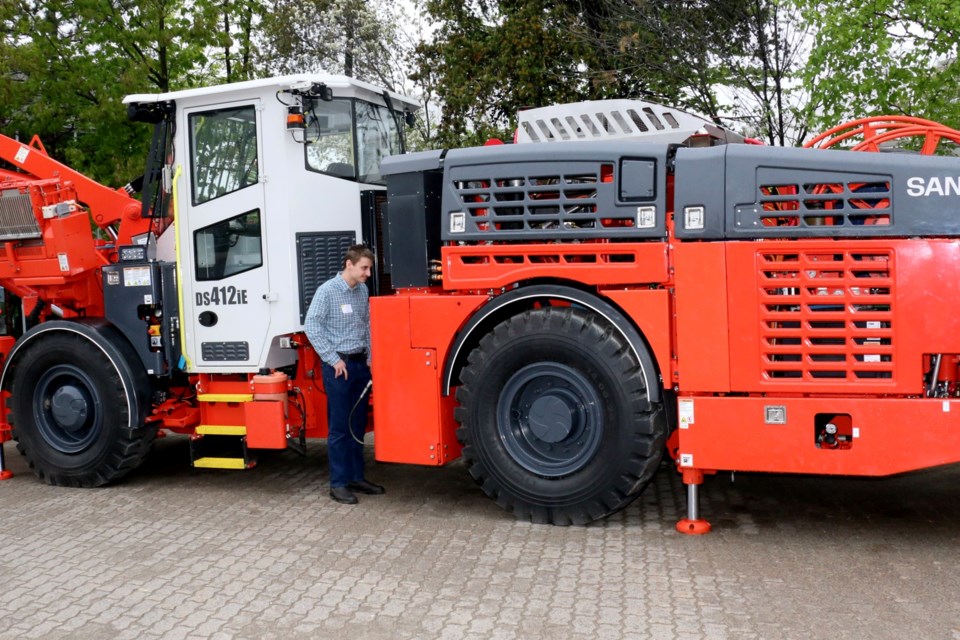Using battery electric vehicles (BEVs) in Northern Ontario mines is not just a nod toward being more environmentally tuned in, it is also something that makes good economic sense.
That was part of the message from Sudbury mining executive Peter Xavier who was a speaker last week at Sudbury's first ever municipal conference to examine the importance of BEVs.
Xavier, who is vice-president of Glencore's Integrated Nickel Operations in Sudbury, said the company is finding it has to go to greater depths to find and recover new sources of nickel.
Glencore plans to use battery electric mining vehicles to recover that nickel, one of the key minerals required for industrial-sized vehicle batteries.
"You know, we've been here for almost 100 years. So a lot of the near-surface deposits are long gone, and we're getting deeper and deeper. And of course, the subject of this presentation is one of those projects, you know, getting down well below 2,000 metres." Xavier said.
Xavier was talking about the extension of the old Craig Mine in Sudbury, which is known as the Onaping Depth project. Xavier said the plan for Onaping Depth is to have 100 per cent BEVs for the underground vehicles.
Xavier said the Onaping project is Glencore's first foray into deep mining in Sudbury, so there was much to consider in the actual logistics and challenges of mining deeper. The company approved building the new mine in 2017. It is expected to become fully operational in 2025.
"So you can imagine, you know, going to greater and greater depths that go after the same material, it's just more intense. So, there's more work at depth, you have temperatures 40 to 50 degrees; the rock temperature, which is a challenge."
He said one of the largest fixed costs in any underground mine is the cost of ventilation. Having electric vehicles — instead of the conventional diesel-powered mining machines — means a lot less diesel exhaust in underground spaces.
Xavier said there is also the challenge of heating the mine air in winter so that people in the underground shops don't freeze.
And then as the mine goes deeper, more fresh air must be sent deeper and it has to be cooled to adjust for the increasing rock temperature at depth.
Xavier said the saving grace is that by eliminating diesel vehicles, the mine actually requires less air for heating the shops and less air for cooling the working spaces in the deeper parts of the mine. Not to mention the considerable cost savings in paying for diesel fuel.
Xavier said it only made sense to choose all electric vehicles for the mine.
But when the Onaping Depth project was finally approved back in 2017, Xavier said a lot of the BEV mining vehicles didn't even exist back then; certainly not on the scale that Glencore would require.
That's when "something really interesting happened,” Xavier said.
Glencore, Vale, Newmont and other Northern Ontario mining operations began asking for BEVs from the mining equipment companies, he said. Xavier said the mining companies were suddenly "like-minded and wanted to go in the same direction" with using battery mining vehicles.
He said it was a leap of faith, but added it was fundamental for mining companies to stay economically viable.
Another benefit, said Xavier, is the health and safety dividend for company employees. He said the elimination of diesel fumes underground is expected to pay off significantly.
He said there is still much to learn about running BEVs in the mining environment, but so far the indicators are good. Xavier said there were concerns about vehicle performance, about the longevity of the batteries, about the charging times for individual machines and whether the machines were up to the task.
"So, I think right across the board on every metric that matters, the testing proves that it was better equal to or better than what we expected. So that was a confidence builder," he said.
— Sudbury.com




